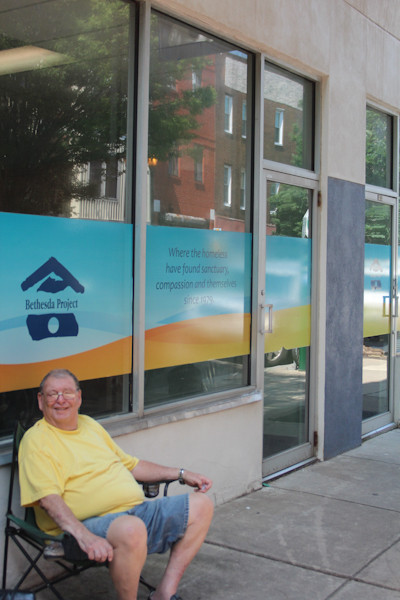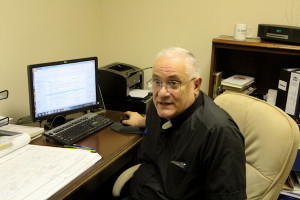
[vimeo 69105462]

The houses of the Bethesda Project, a non-profit shelter for the homeless, house the people of Philadelphia who desperately need help.
Most of the Bethesda Project’s house are somewhat discreet, noticeable only by the small sign on their door, but inside they help the homeless work to regain a sense of self worth within our society.
It all started in 1975 after the United States Supreme Court ruled in a landmark case about mental illness in America. In the O’Connor v. Donaldson case, the court ruled that it is unconstitutional to commit an individual involuntarily who is not dangerous to himself or others. After this ruling was passed, the homeless population of cities around the country like Philadelphia increased significantly.
At the same time Reverend Domenic Rossi from the Daylesford Abbey, in Paoli Pennsylvania led a weekly prayer group of a few hundred members. The prayer group decided to take up a weekly collection to benefit the growing number of homeless men and women in Philadelphia suffering from mental illness.
As the donations increased and the local support for the prayer group grew a project was born, and in 1979 Reverend Domenic Rossi founded the Bethesda Project.
“We took over a building at 12th and Sansom Street and we housed 10 men and women who had been chronically homeless because of mental illness, and little by little it grew,” Rossi explained.
The Bethesda Project’s name comes from the Hebrew meaning, “the house of loving kindness.” Bethesda is also the name of the pool of water where Jesus of Nazareth healed a man who had been ill for 38 years because no one helped him.
In 1982 the Bethesda Project became a tax-exempt organization and opened additional locations throughout the city.
During the first five years the organization was completely volunteer based but in 1984 Rossi hired employees for the men’s shelters. The Bethesda Project also partnered with local churches and other non-profits to further care for the homeless.
“Because of the change in law in the 1970’s, there were hundreds of people released from mental health institutions and many of them wound up on the streets,” said Rossi. “We provide a continuum of care, not only shelters but also a permanent supportive housing so they can live with dignity and the maximum amount of independence possible.”
Their mission works to fight the isolation which comes with homelessness and to be family to those who have none while providing the necessary support needed.
“What if this person was my grandmother or my aunt or sister,” Rossi said. “I would try to do whatever I could to find the resources to help them, so that’s what we did.”
The Bethseda Project currently enlists over 3,500 volunteers a year. Some people support the project financially, others send in clothing, food and other necessary supplies. Others help with the participants in the project by teaching them how to read or play bingo.
“Our volunteers are our biggest promoters and tell our story as best they can,” Rossi said. “They help participants to realize and experience their acceptance as worthwhile members of the community who can thrive.”
A local organization working to end homelessness there are about 4,000 homeless people in Philadelphia on any given day. Within the 4,000 people about 80 percent are African American and 15 percent are White, according to Project Home.
“When we started in the late 1970s there were thousands of people on the street,” Rossi said. “The Bethesda project is now serving 500 of them every night and if we weren’t doing that it’s a reasonable assumption that those 500 people would be back out on the streets again.”
Although the laws changed from 1975 until now, many believe the mentally ill still fall victim to the systems in place within our government.
“We wanted to establish those kinds of trusting relationships to make it easier for a person with a difficulty to manage in a complex bureaucracy,” Rossi explained.” “To help them take advantage of whatever is available in ways they would not normally know how.”
In the past 30 years the Bethesda Project has thrived on donations and help from the government but they also have other ways of continuing their mission.

“We recently had a major fundraising event at the end of April in the Diamond Club at Citizens Bank Park,” Rossi said. “We had Joe Piscopo as our MC, he was a famous comedian on Saturday Night Live, and Bernie Parent, a famous flyers goalie, helped us to raise some nice money for our organization.”
Currently there are 15 Bethesda Project locations serving over 500 people per day in the winter and about 400 during the summer.
“There are two main directions society can go in, we can opt for a society where it’s every man and woman for themselves, a dog eat dog world,” Rossi said. “The alternate option is to have a caring society that is concerned for each of its members, especially those that are most vulnerable, we opt for the latter.”


Be the first to comment